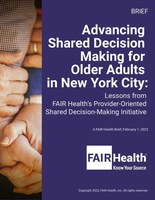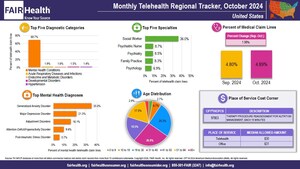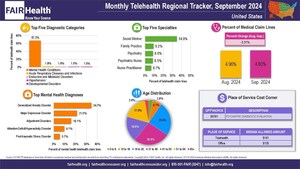FAIR Health Initiative Reveals Appetite for Shared Decision Making (SDM) among Providers
Eighty-Seven Percent of Providers Found SDM Content on Provider-Facing Site "Useful" or "Very Useful"
Almost 79 Percent "Likely" or "Very Likely" to Engage in SDM after Visiting the Site
NEW YORK, Feb. 1, 2022 /PRNewswire/ -- FAIR Health has published a report on the successful results of an initiative to advance shared decision making related to the care of seriously ill older adults through our provider-facing website, fairhealthprovider.org (FAIR Health Provider). Generously funded by The Fan Fox & Leslie R. Samuels Foundation (Samuels Foundation), the site offers free educational resources and tools pertaining to shared decision making.
The Samuels Foundation grant enabled FAIR Health to develop and disseminate a curriculum on shared decision making (SDM) to providers and clinicians in New York City who serve older adults facing critical palliative care decisions. The initiative complements an existing FAIR Health project that was funded by The New York Community Trust and included the creation of free consumer tools presenting three decision aids (DAs) for palliative care scenarios paired with cost information, housed on the FAIR Health Consumer website. These palliative care DAs provide treatment options and associated costs for kidney dialysis, breathing assistance and nutritional assistance. The initiative funded by the Samuels Foundation supported the creation of a new provider-oriented website, FAIR Health Provider, which features educational content and other resources pertinent to SDM. The website was launched in April 2021, followed by an evaluation that assessed its acceptability and utility. The findings of that evaluation are summarized here.
Takeaways from the Report
Providers found the SDM content and resources on FAIR Health Provider useful in facilitating SDM conversations with older adults, as supported by both qualitative and quantitative feedback received during the evaluation period. Nearly 87 percent of survey respondents noted that the site's SDM content was "useful" or "very useful," and close to 79 percent reported that they will "likely" or "very likely" engage in SDM after visiting the site. Providers also found the cost information on the DAs to be valuable, with one respondent stating, "The cost of specific interventions is not easy information to find, even as a clinician."
Provider acceptability of SDM tools is a critical pathway for promoting SDM in general. While there is evidence to support the acceptability of SDM tools among consumers (e.g., FAIR Health Consumer, where the current DAs are housed, saw an uptick in visits after FAIR Health Provider was launched), providers report some issues facing full adoption of SDM tools. In the qualitative evaluation of this project, providers cited time constraints with patients and the need for educational and clinical resources as challenges that prevented SDM discussions. Providers mentioned that offering easily accessible information and tools such as DAs, checklists and toolkits would better support the effort.
To continue to build on the strong support that SDM tools with cost information have received, FAIR Health will continue to enrich and maintain the SDM sections of FAIR Health Provider and FAIR Health Consumer. This year, FAIR Health has been awarded funding from the New York State Health Foundation to create three new SDM tools to advance SDM among people of color, in addition to funding from The John A. Hartford Foundation to create four new SDM tools and three total treatment cost scenarios concerning conditions that affect older adults.
FAIR Health President Robin Gelburd said, "We are extremely grateful for the support of the Samuels Foundation in carrying out this important initiative related to shared decision making. As our report shows, there is an obvious appetite for shared decision-making tools. We look forward to continuing to build on this work."
Lauren Weisenfeld, Deputy Director of the Healthy Aging Program at the Samuels Foundation, said, "The Samuels Foundation is pleased that providers who serve older patients in New York found the educational content and tools on the FAIR Health Provider site to be helpful. The report underscored the opportunity that exists for expanding shared decision making to improve the care of older adults. We look forward to seeing FAIR Health's continued efforts in this area."
To read the entire report, click here.
Follow us on Twitter @FAIRHealth
About the Samuels Foundation
Based in New York City, The Fan Fox & Leslie R. Samuels Foundation (the Samuels Foundation) focuses on two primary grant-making areas: the performing arts and healthy aging. The mission of the Samuels Foundation's Healthy Aging Program is to improve the health care and overall quality of life for New York City's older adults, as well as to improve the way health and social services are delivered.
About FAIR Health
FAIR Health is a national, independent nonprofit organization that qualifies as a public charity under section 501(c)(3) of the federal tax code. It is dedicated to bringing transparency to healthcare costs and health insurance information through data products, consumer resources and health systems research support. FAIR Health possesses the nation's largest collection of private healthcare claims data, which includes over 35 billion claim records and is growing at a rate of over 2 billion claim records a year. FAIR Health licenses its privately billed data and data products—including benchmark modules, data visualizations, custom analytics and market indices—to commercial insurers and self-insurers, employers, providers, hospitals and healthcare systems, government agencies, researchers and others. Certified by the Centers for Medicare & Medicaid Services (CMS) as a national Qualified Entity, FAIR Health also receives data representing the experience of all individuals enrolled in traditional Medicare Parts A, B and D; FAIR Health includes among the private claims data in its database, data on Medicare Advantage enrollees. FAIR Health can produce insightful analytic reports and data products based on combined Medicare and commercial claims data for government, providers, payors and other authorized users. FAIR Health's systems for processing and storing protected health information have earned HITRUST CSF certification and achieved AICPA SOC 2 compliance by meeting the rigorous data security requirements of these standards. As a testament to the reliability and objectivity of FAIR Health data, the data have been incorporated in statutes and regulations around the country and designated as the official, neutral data source for a variety of state health programs, including workers' compensation and personal injury protection (PIP) programs. FAIR Health data serve as an official reference point in support of certain state balance billing laws that protect consumers against bills for surprise out-of-network and emergency services. FAIR Health also uses its database to power a free consumer website available in English and Spanish, which enables consumers to estimate and plan for their healthcare expenditures and offers a rich educational platform on health insurance. An English/Spanish mobile app offers the same educational platform in a concise format and links to the cost estimation tools. The website has been honored by the White House Summit on Smart Disclosure, the Agency for Healthcare Research and Quality (AHRQ), URAC, the eHealthcare Leadership Awards, appPicker, Employee Benefit News and Kiplinger's Personal Finance. FAIR Health also is named a top resource for patients in Dr. Marty Makary's book The Price We Pay: What Broke American Health Care—and How to Fix It and Dr. Elisabeth Rosenthal's book An American Sickness: How Healthcare Became Big Business and How You Can Take It Back. For more information on FAIR Health, visit fairhealth.org.
Contact:
Rachel Kent
Senior Director of Marketing, Outreach and Communications
FAIR Health
646-396-0795
[email protected]
SOURCE FAIR Health

WANT YOUR COMPANY'S NEWS FEATURED ON PRNEWSWIRE.COM?
Newsrooms &
Influencers
Digital Media
Outlets
Journalists
Opted In







Share this article